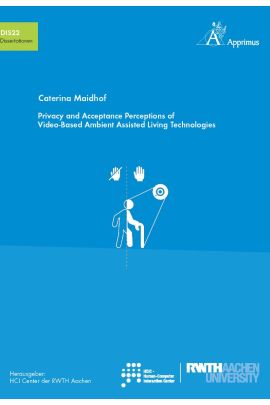Cameras as part of AAL technologies could play a significant role in future healthcare and elderly care, addressing challenges of demographic shifts. Visual sensors offer benefits like enhancing independence for older adults and easing caregiver workloads. However, privacy concerns substantially affect acceptance, requiring a deeper understanding of users' needs and perceptions. This work aimed to address gaps by exploring privacy and acceptance factors for video-based AAL systems through a multi-stage empirical approach.
The first stage examined privacy perceptions in daily life, highlighting its multi-dimensional nature, including informational and psychological aspects. Privacy concerns varied depending on the entity involved, with personal entities like healthcare providers viewed as less intrusive than impersonal ones such as insurers. Technology-related privacy violations, particularly involving nudity, were seen as more negative than human-related violations, stressing the need for privacy-by-design principles.
The second stage investigated acceptance of video-based AAL across different contexts, finding higher acceptance for household activities and lower for intimate ones. Benefits like faster emergency responses and increased safety were most valued, while concerns about surveillance and data misuse emerged as major barriers. Technological factors (e.g., data storage) and user characteristics (e.g., age, technical affinity) influenced acceptance.
In the third stage, a privacy-informed acceptance model integrated privacy calculus and technology acceptance theories. Results showed perceived benefits strongly drove acceptance, while privacy concerns had a moderate negative impact. Activity-specific privacy needs shaped preferences for data handling, emphasizing the importance of privacy-utility trade-offs.
The final stage simulated decision-making, revealing preferences for less recognizable images to ensure bodily privacy and granting data access to emergency services over relatives. Medium data storage durations were favoured, with local storage slightly preferred. Two user groups emerged with differing preferences but similar overall acceptance, underlining the need for customizable privacy settings.
The work offers practical recommendations for designing privacy-enhancing, user-centred video-based AAL technologies, benefiting developers, legal researchers, and healthcare planners to meet technical, legal, user, and societal needs.
| Autor | Maidhof, Caterina |
|---|---|
| Gewicht | 0.352 kg |
| Erscheinungsdatum | 18.02.2025 |
Eigene Bewertung schreiben
Human Computer Interaction Center (HCIC)
Privacy and Acceptance Perceptions of Video-Based Ambient Assisted Living Technologies
ISBN: 978-3-98555-263-4
Lieferzeit: 2-3 Tage
54,00 €
inkl. 7% MwSt.
Kurzbeschreibung
This dissertation explores the role of video-based Ambient Assisted Living (AAL) technologies in healthcare, focusing on privacy and acceptance. A multi-stage empirical approach examines privacy perceptions, acceptance factors, and their interplay. Results highlight the importance of privacy-by-design, contextual acceptance differences, and user-specific preferences for data handling. The findings inform user-centred, privacy-enhancing AAL designs, addressing societal and demographic challenges.
Auf Lager

